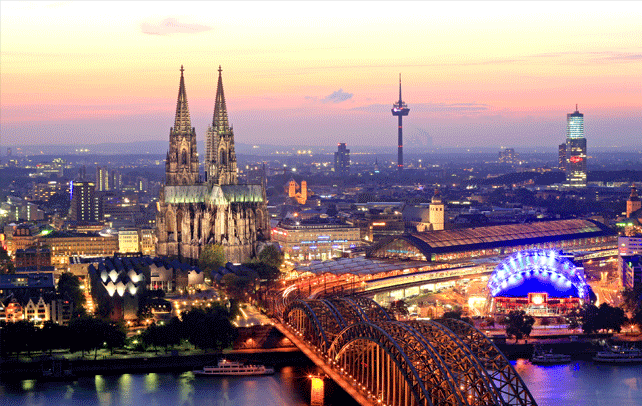Fun Facts About Germany

Germany is a federal parliamentary republic in Europe with Berlin as its capital City. This country which extends over 357,021 square kilometers today was largely a part of the Holy Roman Empire in ancient times. It consists of 16 states and many cities with Berlin being the largest city of all. Germany is located in Western and Central Europe and enjoys a temperate climate. The country became the founding member of the European Union in 1957 and is now a powerful member of many international organizations like NATO (North Atlantic Treaty Organization), UN (United Nations), G8, G20, Council of Europe, OECD (Organization for Economic Co-operation and Development) etc. Germany has now become the fourth largest economy of the world and the people of Germany enjoy a good standard of living. The country has a rich cultural backdrop and a peaceful political atmosphere. This country has given the world several important personalities including scientists and inventors. Browse through the following section to know more interesting facts about this country.
Fast Facts
Official Name: Federal Republic of Germany
Continent: Europe
Language(s) Spoken: German
Capital: Berlin
Demonym: German
States: 16
Area: 357,021 sq. km
Population: 81,799,600 (as of 2010 census)
Currency: Euro
Interesting And Fun Facts About Germany.
- The official name of Germany is “The Federal Republic of Germany”.
- Germany is the most populous member state in the European Union and also the largest economy of the group.
- Germany is the world’s second largest car producer after Japan.
- Berlin is the largest city and the capital of Germany.
- German economy is world’s fourth largest economy in terms of nominal GDP but it still has the highest rate of unemployment.
- It holds the fifth global position in terms of purchasing power parity and is home to the European Central Bank.
- Germany is the world’s third largest importer and the second largest exporter of goods.
- Frankfurt International Airport, the most important German airport, holds the world record for the largest number of international destinations served.
- Lufthansa, the world’s largest airline in terms of international passenger traffic, kilometers flown, freight ton-kilometers flown and fleet size, is based in Frankfurt.
- Adolf Hitler, a prominent German, led the National Socialist German Workers Party, which is popular by the name Nazi. He is commonly associated with World War II, the rise of fascism in Europe and the Holocaust.
- Germany is proud of its athletes who have won about 1548 Olympic medals from both summer and winter Olympics.
- Germans are ranked second in terms of beer consumption, with an average of 119 liters per person per year, the first place being held by the Irish people.
- About 15 million of the population is of non-German descent whereas about a one-fourth of American citizens claim German ancestry, at least partial.
- Germany is home to the world’s most colorful caves “The Fairy Grottoes” (Feengrotten) located in Saalfeld, Thuringia.
- Germany has the highest number of half-timbered houses in the world.
- There are 1,300 beer breweries in Germany, making some 5,000 kinds of beer.
- Germans are keen about re-cycling materials. According to a survey conducted by BBC, Germany had the third highest recycling rate after Switzerland and Austria.
- About forty-two of the Nobel laureates studied or taught at the Georg-August University of Göttingen. Some famous Nobel laureates are Carl Friedrich Gauss, Otto von Bismarck, etc.
- Smoking in public place is not banned in Germany. The reason behind this is that the pre World War II Nazis officially opposed smoking and post-war, the new legislators were afraid of being misconceived as followers of Nazi regulations.
- The biologist Ernst Haeckel, who coined the term “ecology” in 1866, was a German.
- Germany is home to world’s first nature reserve Drachenfels (Siebengebirge) which is in North Rhine-Westphalia. It was announced as a nature reserve in 1836.
- Germany is the world largest wind energy producer with over 20,000 wind turbines located off the coast of northern Germany. The largest wind turbine is 200 meters high.
- Germans boast of having the biggest train station (Lehrter Bahnhof) in Europe.
- The Goseck circle in Saxony-Anhalt, established about 7,000 years ago, is the oldest known sun observatory.
- The Weihenstephaner Brewery is the world’s oldest brewery. It was founded in 1040 A.D.
- The world’s first protestant university, The University of Marburg was founded in Germany in 1527 A.D.
- Germany is home to the world’s two biggest cuckoo clocks which are located in Baden-Württemberg.
- Germany is home to world’s oldest savings bank which was established in Oldenburg in 1786 A.D.
- The tallest Cathedral in the world, Ulm Cathedral, is in Germany. It is 161.53 meters (530 feet) high.
- The oldest motorway in the world is the ‘German Autobahn’. It is the densest motorway in the world. It does not have a general speed limit and is the only one of that kind in Europe.
- There are more than 300 bunkers and hundreds of kilometers of underground tunnels in Germany, which were built during the Nazi-era. They still remain beneath the city of Berlin but, are inaccessible as they are submerged owing to flooding from water tables.
- BASF (Badische Anilin- und Soda-Fabrik), a German company, is the second largest chemical company in the world.
- Germany has the highest number of copyright protections.
- DELAG, (Deutsche Luftschiffahrts-Aktiengesellschaft, or “German Airship Transport Corporation”) was the world’s first airline, founded in Frankfurt on 16 November 1909.









